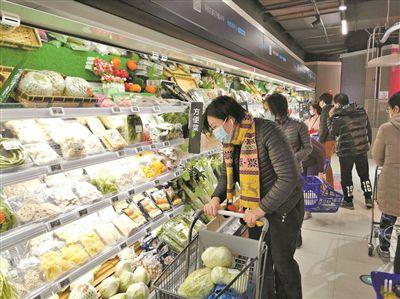Early in the morning, Zhong Yue, a woman who lives in southwest China's Chengdu City, held her breath, stared at her mobile phone, quickly scrolled down the list, then clicked "Checkout."
"Got it! " Zhong yelled. She won the "battle" today.
"In the past week, I have been experiencing a food grabbing 'battle' every day," Zhong said. Due to the novel coronavirus epidemic, she has to stay at home and rely on the online platform to get fresh vegetables and meat. And she must place the order as early as possible in order to get the fresh groceries before it sells out.

A supermarket in Guangzhou, capital of south China's Guangdong Province, during the epidemic period. /Xinhua Photo
A supermarket in Guangzhou, capital of south China's Guangdong Province, during the epidemic period. /Xinhua Photo
In fact, it is not an uncommon phenomenon since the novel coronavirus outbreak. People across the country are shopping online not only to avoid infection, but also because of the shortage of masks.
"If you shop online, you are a saving mask," Zhong explained.
According to the data from Daily Fresh, an online food-delivery platform, their transaction volume has increased by more than 300 percent during the epidemic period, and so has the per capita consumption. Another platform Jingdong Fresh's sales has increased by 215 percent; more than 15,000 tons of fresh food have been sold nationwide in nine days since the Chinese New Year's Eve.

Food delivery men on the road. /VCG Photo
Food delivery men on the road. /VCG Photo
In addition to online shopping and food delivery, many other industries were developing rapidly since the outbreak; such as remote working, online medical services and online education. They are called the "zhai" economy.
"Zhai" is a Chinese buzzword used to describe people who prefer staying at home rather than going outside, which can most closely be translated as homebody. The businesses that target their needs are part of the "zhai" economy.

According to Dingding, an enterprise chat app launched by Alibaba, on the first day after the Chinese New Year holiday, more than 10 million corporations used Dingding to work from home, and launched video conferences online.
Meanwhile, many schools are turning to online education platforms, with many students being forced to stay at home. And patients who are out of reach of professional medical treatment can use online medical platforms to contact doctors.
Zhang Weiguo, director of the Institute of Economics of Shandong Academy of Social Sciences, believes the epidemic and quarantine period would largely boost the development of the "zhai" economy in the near future.
Source(s): Xinhua News Agency